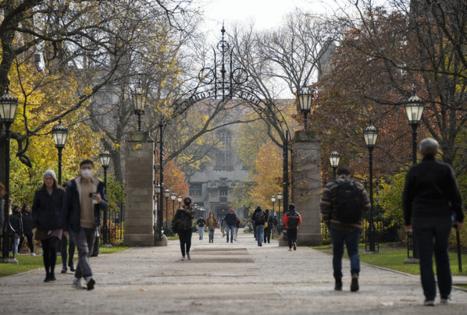Commentary: How wealthy university donors have changed our society for the worse
Published in Op Eds
For a university with a $10 billion endowment, a $100 million donation — like the one an unnamed donor recently made to the University of Chicago’s Forum for Free Inquiry and Expression— might seem like a drop in the bucket. Yet, history suggests that such donations should give us pause, particularly when, like this $100 million donation, they’re earmarked to advance specific intellectual ideas “both on campus and beyond.”
Take, for example, the role that wealthy donors played in bringing us Milton Friedman, Ronald Reagan and the up-by-your-own-bootstraps, winner-take-all, profits-over-people economy that’s leaving so many Americans — and especially women and mothers — still struggling today.
In the 1930s, and as Naomi Oreskes and Erik M. Conway explain in their book “The Big Myth,” wealthy business owners didn’t want to pay the higher taxes required to fund President Franklin D. Roosevelt’s New Deal. So, members of the National Association of Manufacturers (NAM) set out to persuade Americans we could get by without that support and cut taxes instead.
What they found was a group of Austrian economists, such as subsequent Nobel Prize winner Friedrich von Hayek, who were developing a theory of neoliberalism, which is basically the idea that societies are better off without social safety nets because, in the absence of support and protection, people will make better choices to keep themselves safe.
Now, this theory has been thoroughly debunked with data. That’s not how people respond to risk. Yet, wealthy business owners were able to get Americans to believe the theory anyway. And this is where universities and big donors come in.
According to Oreskes and Conway, a group of NAM-associated businessmen coordinated with elite schools such as New York University and the University of Chicago to create positions for and fund the work of those Austrian economists, who also went on to mentor the next generation of scholars and policymakers in the U.S.
Those mentees included fellow Nobel-winning economist Milton Friedman, who is famous for arguing that a corporation’s only job is “to make as much money as possible” for its shareholders and that taxes and regulations should be cut “under any circumstances and for any excuse, for any reason, whenever it’s possible.”
Those same wealthy business owners financed Friedman’s research and the University of Chicago’s Free Market Project, with the goal of launching a massive pro-business, anti-government propaganda campaign.
That campaign included Reader’s Digest reprints of neoliberal treatises, along with Hollywood interpretations of Hayek and Friedman’s ideas. The NAM-funded “The American Family Robinson,” for example, quickly became one of the most popular radio programs across the U.S. And it paved the way for the TV and radio series “General Electric Theater,” hosted by Ronald Reagan, which not only launched his political career but also turned him from a union leader Democrat into an anti-union Republican.
Beyond the media, NAM members also set up libertarian think tanks, many of them staffed by elite university-trained neoliberal economists, which lent an air of scientific certainty to neoliberal theories.
Once those ideas were firmly lodged in American psyches, the next step, as sociologist Elizabeth Popp Berman explains in “Thinking Like an Economist,” was for University of Chicago-trained economists to move into positions with policymaking power. From those positions, they helped lay the groundwork for what political scientist Jacob Hacker calls “The Great Risk Shift” — defunding key parts of the social safety net, defanging unions, slashing taxes on wealthy people and big corporations, and promising (quite falsely) that the wealth would trickle down.
Ultimately, then, and with the help of elite universities, wealthy donors have turned us into what I call a DIY Society, where people are supposed to take care of themselves rather than rely on government to guarantee dignity, economic opportunity or time to contribute to the project of care.
The problem, however, is that we can’t actually be a do-it-yourself society. Some people — like the children, the sick and the elderly — can’t fully take care of themselves. And some jobs don’t pay enough to make ends meet. And that’s where women and mothers come in.
As I find in my research, today’s billionaires and big corporations, along with their cronies in politics, media and academia, maintain the DIY illusion by forcing women to fill in the gaps in our economy and the gaps in our social safety net. Women in the U.S., for example, do almost twice as much unpaid care work as men do, and women — disproportionately women of color — do the bulk of the underpaid care work in fields such as childcare and home health care, which are among the lowest-paid jobs in the U.S. economy as a whole.
Ultimately, then, while donating money to universities might seem like one of the less-bad ways that wealthy people can spend their money, we ought to be wary of what they’re trying to buy with those donations, which goes far beyond securing their own kids’ admission to elite colleges and extends to shaping culture and policy in ways that maintain and justify their influence in society as a whole.
____
Jessica Calarco is a professor of sociology at the University of Wisconsin at Madison and the author of “ Holding It Together: How Women Became America’s Safety Net.”
_____
©2024 Chicago Tribune. Visit at chicagotribune.com. Distributed by Tribune Content Agency, LLC.




























































Comments